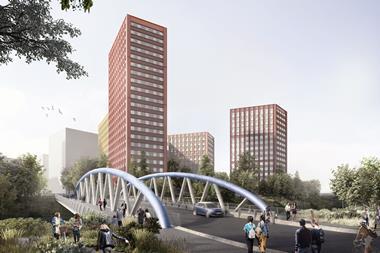Nearly half of the UK’s housebuilders are unconcerned about the possibility of Britain leaving the EU, even though the industry still relies heavily on European labour to fill skills gaps.

Nearly half of the UK’s housebuilders are unconcerned about the possibility of Britain leaving the EU, even though the industry still relies heavily on European labour to fill skills gaps.
According to a survey of 389 owners or directors of housebuilders, 49% said they were not worried about the impact Brexit would have on their business in terms of restricting their ability to recruit from abroad through EU freedom-of-movement rights.
Housebuilders have often recruited from EU countries because of skills shortages in the UK.
The survey for consultant McBains Cooper by Morar Consulting found nearly a third of respondents were worried about the potential impact of Brexit, with firms based in London the most concerned. In the capital, 38% of those surveyed said they were worried about Britain withdrawing from the EU.
Deputy mayor of London Stephen Greenhalgh has warned London risks losing the large numbers of European construction workers it needs to build new homes if Britain leaves the EU.
Skills shortage
Michael Thirkettle, chief executive of McBains Cooper, said housebuilders in London tended to be more reliant on labour from EU countries than those in the regions. “The capital is in the middle of a building and infrastructure boom that requires skilled workers from the rest of the EU,” he said.
“Brexit could lead to a fall in housebuilding in London, hitting the prospects of those wanting to get on the property ladder.”
Businesses were less concerned in the regions, he added. “Many of the companies surveyed are smaller businesses and it seems that Britain withdrawing from Europe is not an issue for most of them.”

The survey found that a chronic skills shortage remained a key concern for the industry, with 27% of respondents identifying this as a key issue holding back their business. Bricklayers (38%) and carpenters (32%) were the trades where shortages were most pressing.
“Around 300,000 people left the construction industry between 2008 and 2010, and because training and apprenticeships take time, the government should allow skilled construction workers to be listed as an occupation with official shortages,” said Thirkettle.
“This would allow more recruitment from outside the EU, which is not currently possible under our immigration system, and help kick-start the housebuilding programme.”
Measures to help
A lack of available land was also identified as a key issue holding back housebuilding levels, with 34% citing it as a restriction on supply.
Nevertheless, nearly half (48%) of firms across England increased their rate of housebuilding over the last year. In London - where housing shortages are most acute - 53% said they had increased their output.
Housebuilders were also asked which single measure they thought the government should introduce to help the industry increase housebuilding: 30% said the government should incentivise builders to develop land with planning permission more quickly; 29% said the government should allow more construction on greenfield sites; and 24% thought more publicly owned land should be released for development.
“Many firms are also reluctant to develop the land banks they have built up until market conditions improve sufficiently to give them a suitable return on their investment through a combination of higher land value, planning permission and house prices,” said Thirkettle.
“The government could play a role in easing these conditions, for example through incentives such as tax breaks or development discounts.”
































No comments yet